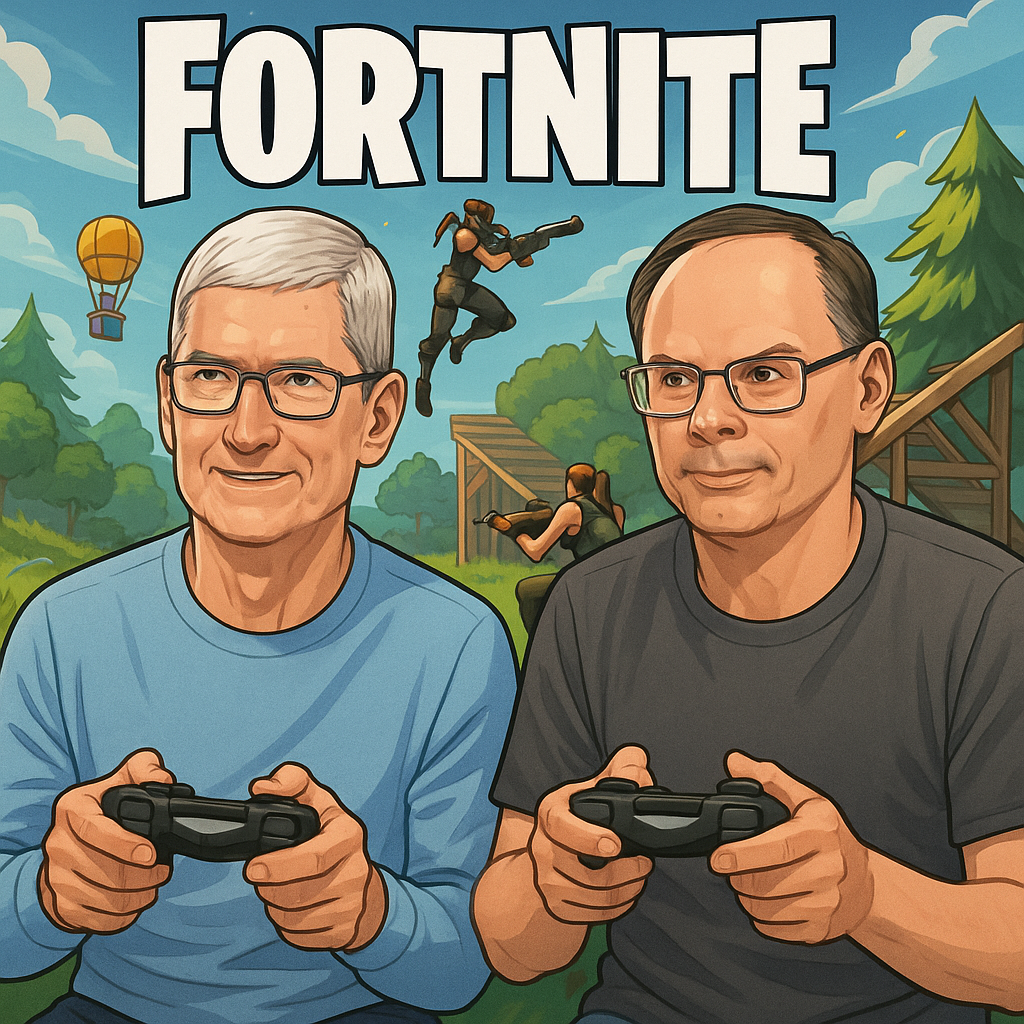Tim Cook Chose Poorly, Now Apple Can Choose Wisely

With regard to my two posts on the Apple/Epic/App Store matter yesterday, a number of folks reached out thinking I actually wasn't being hard enough on Apple, that's just how damning the ruling from Judge Yvonne Gonzalez Rogers truly was. But actually, I aimed to round up and break down the fire she spat at Apple today in a separate post, as I've done with other such things. Then I noticed Sarah Perez beat me to it for TechCrunch, with a comprehensive look at the judge's most choice passages. Reading it over in this succinct form, a few things become even more clear.
First, while most companies play these sort of cat-and-mouse games with various courts, both trying to delay everything as long as possible while also doing the bare-minimum that they can get away with when ordered to do something, Apple certainly seems like they're constantly at the extreme edge of such actions. And, to be honest, it usually works out for them. Not only do they have a track record of winning such cases more than their peers, any penalties they suffer tend to not have much impact on the business.
And so in that light, you can almost – almost – understand Apple's hubris here. They ran the playbook they always run. And they were probably bolstered by the fact that they – and everyone else – clearly felt like they actually "won" this case against Epic. But, as it turns out, the verdict wasn't quite so black and white. And in losing just one smaller aspect of the case, they left themselves vulnerable.
In walks Judge Gonzalez Rogers...
She may as well have written: "I'm not buying nor taking any of your bullshit, Apple. You knew the intent of the ruling against you, and yet you acted in ways to pretend you did not. Worse, I believe you sent deputies up here to knowingly lie to me about crucial aspects of the trial. I've had enough, I hold your company in contempt and now I'm literally holding you in contempt of this court, comply now or risk further wrath."
And that wrath was clearly being directed right at Tim Cook himself. "Cook chose poorly" will go down as one of the great legal lines ever used against Apple. I don't know if it's an Indiana Jones and the Last Crusade reference, but I'm going to, um, choose to believe that it is. And if it is, that's badass. Cook should be thankful that his face isn't about to melt off after drinking from the wrong chalice.
But figuratively, that may be the position in which Cook finds himself right now. He's already a bit – dare I say it – embattled given the complete and utter AI shitshow. And now a federal judge is going right after him. It's almost as if his performance in Apple's earnings call yesterday wasn't an aberration. He might actually be rattled. He's certainly lucky he's the logistics maven in a very specific time in American history where such expertise is perhaps going to be valued more than anything else right now.
But it could be worse for Cook. He could be VP of Finance Alex Roman. This poor guy. You have to assume he took the stand saying what he was told to say. The problem is that what he was told to say may have caught him in a lie. Under oath. In federal court. If that's true, that probably means jail time. I mean, can you imagine? An Apple VP going to jail over this? Just open up the fucking App Store you idiots.
Just a guess, but I imagine Roman may try to plead ignorance here. That even if the whole 27% issue was clearly discussed by Apple beforehand, that he didn't know about it. If that's the excuse, he better hope there's no email trail...
Certainly, it seems that Cook and Phil Schiller and Luca Maestri long knew about the 27% Solution – and Judge Gonzalez Rogers skepticism of it being a genuine solution that Apple was putting forward in good faith. As I wrote in a post a year ago, with a title quoting the Judge: "And you are charging 27%...":
I am quite curious if Schiller or the author here is the one who used "good-faith" because it seems to me that this is the heart of the issue here. While Apple may indeed be following the letter of the law, US District Judge Yvonne Gonzalez Rogers seems skeptical that Apple is doing so in a way that achieves the clear objective of the change she ordered.
The change to anti-steering, which means Apple now has to allow developers to link out from their apps to their websites to allow customers to pay for services outside of the App Store mechanisms, wasn't put in place so people would use the web more. It was put in place so developers could have more flexibility in offering their services to their customers. But the results, so far, are that nothing has actually changed. There is no more flexibility. Because Apple created a situation that is actually worse for developers.
Again, this was a year ago. It was obvious what was going to happen. Apple only have themselves to blame for this blowing up in their faces. And now Cook is being called out, Maestri is gone – which seems unrelated but is fairly curious timing – and only Schiller looks like a voice of reason.
I'll admit that I sort of assumed Schiller took on the enforcer role with the App Store in order to stand up for anything and everything that Steve Jobs put in place nearly 20 years ago – no matter how out of touch and out of date in our current world. But at least in this particular situation, I was wrong. And Schiller deserves a lot of credit for trying to argue for doing the right thing – i.e. not trying to charge developers even more than the 30% cut if they choose to circumvent the App Store rails. The 27% thing was bullshit, everyone knew it, but only Schiller argued against it. And he was overruled.

The Cup of a Carpenter
Where we go from here is one of the most fascinating questions about Apple in quite some time. While they're appealing Judge Gonzalez Rogers' orders, they're also complying with them, starting with developer guideline updates today. That's seemingly going to be a very hard genie to put back into the bottle. While it will be technically possible to roll-back such changes, of course, optically, that would make Apple look even worse. To regulators, to developers, and to consumers.
I'm honestly not sure Apple can go back now. And we're about to hear Sun Tzu, I mean Tim Sweeney, get even more vocal on the matter since the changes Apple implemented today are only related to the US market. Obviously, that's all Apple had to do, legally. But Sweeney teed this up to be his next PR battle royale.
We're just a few weeks away from WWDC. That's where Apple will clearly try to redirect the narrative. The problem is that the belle of last year's ball, Apple Intelligence, is in tatters right now. So much so that the Vision Pro, their most recent attempt at the Next Big Thing™ that wasn't, looks great by comparison. And so much so that the team behind that misstep is now swooping in to try to fix Siri. My point is that Apple doesn't have a lot of obvious levers left to pull in order to change the conversation.
But they do have one. Tear down the App Store walls.
No one is saying Apple can't make money from the App Store. But we're a long way from Jobs setting it up to be break-even at best, and a loss-leader at worst. Wall Street will hate the hit to Services revenue – especially if that line is about to take an even bigger hit with the Google Search default payments going away – but at some point you have to just do the right thing or risk losing everything.
You have to drink from the poisoned chalice. It might just be the Holy Grail. Choose wisely and you may just live forever.
Cut the App Store fees substantially, and make them far more granular. Formalize the ability for developers to link out to other payment options without taking a cut.1 Hell, allow (vetted) third-party payment options to be brought into the in-app experience. In other words, compete!
That's the thing, the company already has such a built-in advantage and makes great, easy-to-use tools that they should win most of the time by default. They shouldn't fear such competition, it should make them even better – certainly it will make the offerings better for developers and consumers. It's time to move beyond the Nanny State. Let developers and consumers... choose.
To again quote the judge, "there is no second bite at the apple."
One more thing: if Apple wants to go really crazy and earn back all the love they've lost in the developer ecosystem: open up web distribution for apps. Do it just as it's done on the Mac, and I think it's fine to limit it to signed/vetted developers, for now. Apple will scream "security!" here, but it's 2025. The iPhone is nearly 20 years old. It's time.

Update:
I actually forgot that I wrote the following a year ago after an early indication that Judge Gonzalez Rogers viewed Apple's new 27% fee as problematic:
This sounds bad for Apple, but the question is what Rogers will do about it. Presumably she won't force a certain number/cut upon Apple, but will instead make them come up with a better deal. Which Apple will then once again take as long as possible to come up with and implement. And it will likely be restrictive in some other way that will dissuade developers from using it. And around and around we'll go...
Still, you have to wonder if the .058% uptake didn't highlight just what a mockery Apple seemed to make of the ruling here that Rogers doesn't push for something more...
Well, she did.
Update May 21, 2025: Game over. (For now.)

1 If there needs to be some sort of App Store listing fee or whatnot, fine. That should be relatively small. There's already the developer account fee.

